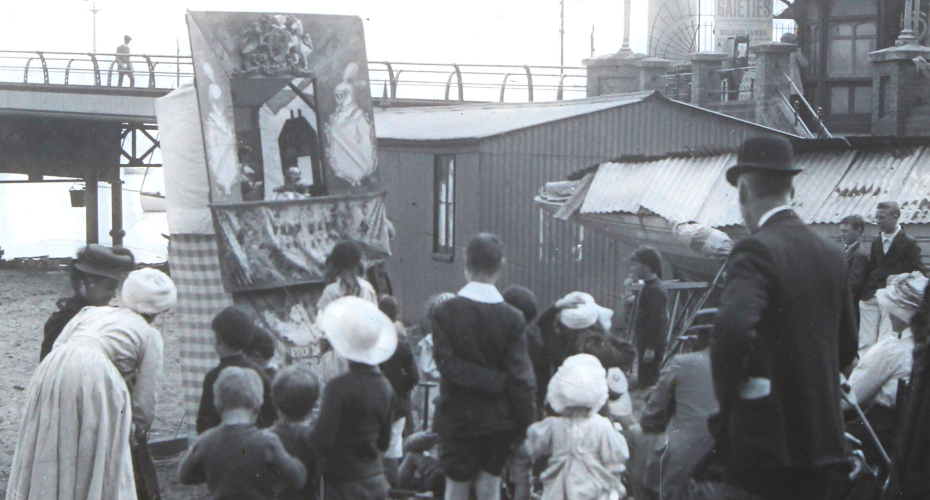A contemporary version of Punch and Judy that presents a more gender balanced representation of the controversial couple is set to make its debut at a major festival in London next month.
The new show, which sees Ms Judy take centre stage and question the nature of her 360-year marriage, will be performed for the first time at the 49th annual Covent Garden May Fayre and Puppet Festival.
It has been developed by a team led by drama academics at the University of Exeter, as part of The Judy Project, a three-year investigation into the roles that women have played in this puppetry tradition over the past 300 years and how gender is portrayed through the artform.
It draws upon historical figures and movements such as the Suffragettes and Pride in its costumes and set colours, and will tour seasides in South West England throughout the spring and summer.
"At its core, this is a Punch & Judy show with familiar characters-Ms Judy, Mr Punch, Joey the Clown, the Police Man, the Crocodile and the Devil-but not all are fulfilling their most familiar roles," says Dr Alissa Mello, the project's lead and Marie Sklodowska-Curie Postdoctoral Research Fellow in Exeter's Department of Communications, Drama and Film. "There are subtle practical, narrative and design changes and updates that may or may not have meaning for everyone, but are there if one is looking. Each adds a new and modern layer, expanding who the show is for and what meaning it conveys."
The annual edition of the Covent Garden May Fayre and Puppet Festival will see Punch and Judy Professors and puppeteers from across the country gather to perform in the Garden of St Paul's Church. And in 2024 - the 362nd anniversary of Punch's first recorded sighting by Samuel Pepys - the line-up will include The Judy Project's uniquely modern approach to the characters.

Dr Mello, an expert in puppetry performance, developed the show in collaboration with Nephew Spike Bones, an emerging Punch Professor, colleague Dr Tony Lidington and his social enterprise, Promenade Promotions Limited, which supports traditional forms of seaside entertainment and culture, and additional consultation with Suffragette scholar, Naomi Paxton.
Bones developed many of the puppet scenes, and these were then refined and iterated upon in collaboration with the team, and trialled with drama students, faculty and entertainment colleagues as well as students at West Cliff Primary Academy, a local primary school.
"Our challenge was how to work with, and update, a traditional form of entertainment that comes with a lot of audience expectation about what it is," says Spike Lidington. "Whether you view it as misogynistic and making light of domestic violence, or as romping family entertainment and a keystone of English seaside culture, it is something that tends to provoke a deep-seated response. In the end we spent a lot of time laughing, so our hope is that audiences will do so too."
The first documented performance of the Punch character was recorded by Samuel Pepys in his diary of 9 May 1662, when a marionette puppet called Pulcinella, rooted in the commedia dell'arte tradition of Italy, played at Covent Garden and shortly after at the Court of King Charles II. British puppeteers quickly adopted the character, and employed him and sometimes his then wife, Joan, as a disruptive crowd-pleaser.
It was not until the late 18th century that the booth show we are more familiar with today began to appear. As the characters became hand puppets, so their new-found portability enabled them to migrate away from urban theatres to become staples of popular street and seaside entertainment.
The 18th century actress Charlotte Charke, who ran her own Punch's Theatre for a period, is one of the influences on the new show, along with the Suffragettes and the Pride movement.

"We think of Punch and Judy as this very traditional form of entertainment, but it's actually remained very nimble throughout history," says Dr Lidington, Lecturer in Drama and an expert in British popular entertainment. "Its cast of characters have evolved to reflect audience tastes and current concerns, such as Adolf Hitler temporarily replacing the figure of the Devil, and the phasing out of the Chinese jugglers and Punch's mistress, Pretty Polly. So, in that sense, our show is keeping with tradition."
The Judy Project: A Critical and Historical Investigation of Women and Puppetry from the Eighteenth to the Twenty-First Century has been funded by the European Union's Horizon 2020 research and innovation programme under the Marie Skłodowska-Curie grant and the University of Exeter's Public Engagement with Research fund. As part of this, Dr Mello has been visiting archives around Europe and the United States to research the changing nature of the characters and the people connected to them.






